一般现在时与现在进行时的区别
一般现在时和现在进行时区别及习题
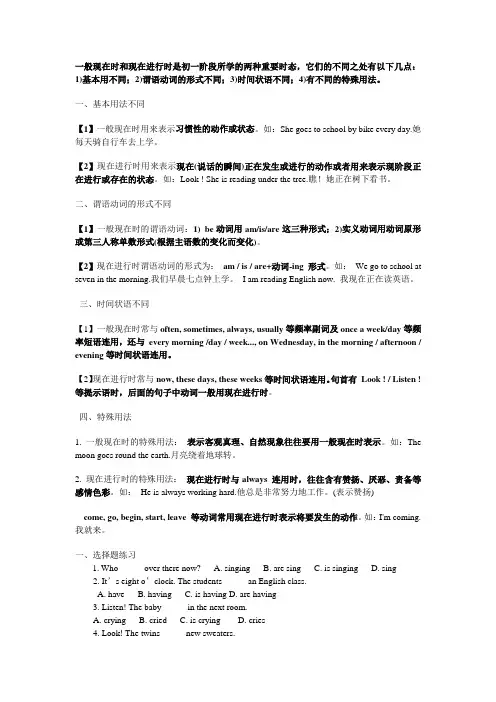
一般现在时和现在进行时是初一阶段所学的两种重要时态,它们的不同之处有以下几点:1)基本用不同;2)谓语动词的形式不同;3)时间状语不同;4)有不同的特殊用法。
一、基本用法不同【1】一般现在时用来表示习惯性的动作或状态。
如:She goes to school by bike every day.她每天骑自行车去上学。
【2】现在进行时用来表示现在(说话的瞬间)正在发生或进行的动作或者用来表示现阶段正在进行或存在的状态。
如:Look ! She is reading under the tree.瞧!她正在树下看书。
二、谓语动词的形式不同【1】一般现在时的谓语动词:1) be动词用am/is/are这三种形式;2)实义动词用动词原形或第三人称单数形式(根据主语数的变化而变化)。
【2】现在进行时谓语动词的形式为:am / is / are+动词-ing 形式。
如:We go to school at seven in the morning.我们早晨七点钟上学。
I am reading English now. 我现在正在读英语。
三、时间状语不同【1】一般现在时常与often, sometimes, always, usually等频率副词及once a week/day等频率短语连用,还与every morning /day / week..., on Wednesday, in the morning / afternoon / evening等时间状语连用。
【2】现在进行时常与now, these days, these weeks等时间状语连用。
句首有Look ! / Listen !等提示语时,后面的句子中动词一般用现在进行时。
四、特殊用法1. 一般现在时的特殊用法:表示客观真理、自然现象往往要用一般现在时表示。
如:The moon goes round the earth.月亮绕着地球转。
(完整版)一般现在时和现在进行时的区别(最新整理)
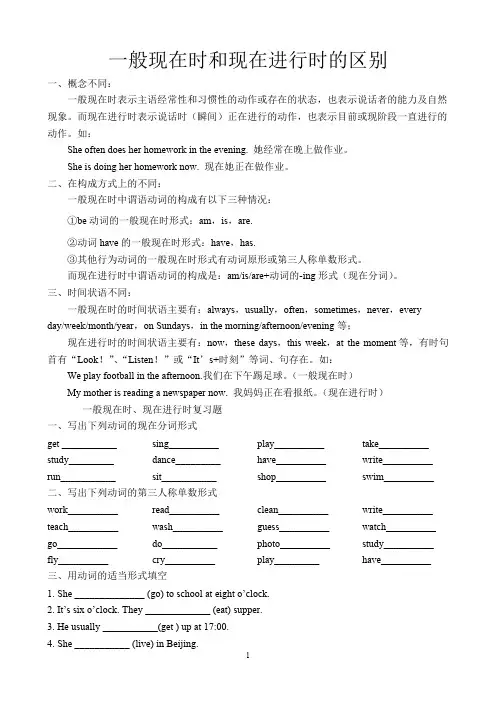
一般现在时和现在进行时的区别一、概念不同: 一般现在时表示主语经常性和习惯性的动作或存在的状态,也表示说话者的能力及自然现象。
而现在进行时表示说话时(瞬间)正在进行的动作,也表示目前或现阶段一直进行的动作。
如: She often does her homework in the evening. 她经常在晚上做作业。
She is doing her homework now. 现在她正在做作业。
二、在构成方式上的不同: 一般现在时中谓语动词的构成有以下三种情况: ①be动词的一般现在时形式:am,is,are. ②动词have的一般现在时形式:have,has. ③其他行为动词的一般现在时形式有动词原形或第三人称单数形式。
而现在进行时中谓语动词的构成是:am/is/are+动词的-ing形式(现在分词)。
三、时间状语不同: 一般现在时的时间状语主要有:always,usually,often,sometimes,never,everyday/week/month/year,on Sundays,in the morning/afternoon/evening等; 现在进行时的时间状语主要有:now,these days,this week,at the moment等,有时句首有“Look!”、“Listen!”或“It’s+时刻”等词、句存在。
如: We play football in the afternoon.我们在下午踢足球。
(一般现在时) My mother is reading a newspaper now. 我妈妈正在看报纸。
(现在进行时)一般现在时、现在进行时复习题一、写出下列动词的现在分词形式get ___________sing__________play__________take__________ study_________dance_________have__________write__________ run___________sit___________ shop__________swim__________二、写出下列动词的第三人称单数形式work__________read__________clean__________write__________ teach__________wash__________guess__________watch__________ go____________do___________photo__________study__________ fly__________cry__________ play_________have__________三、用动词的适当形式填空1. She ______________ (go) to school at eight o’clock.2. It’s six o’clock. They _____________ (eat) supper.3. He usually ___________(get ) up at 17:00.4. She ___________ (live) in Beijing.5、I (want) to do homework now.6、My father always __________(come) back from work very late.7、The teacher is busy. He __________ (sleep) six hours a day.8、Listen! Jane __________(sing) in the classroom. She often _________ (sing) there.9、__________ your brother __________(know) Japanese?10、Where __________ you __________ (have) lunch every day?11、The girl _____(like) wearing a skirt. Look! She ______ __(wear) a red skirt today.12、It's time______ (go) to school13、______you______(clean)the blackboard now?14、Let's ______(go)and help her.15、What are they doing? They ___________(put)things away.16、He often _________ (have)supper at 6:00 in the evening.17、It’s 6 o’clock in the morning. He ___________.(get)up.18、Tom _________ (have) an English class now.13. Listen! The girl _____________(sing)in the room.14. I ___________(read)a book in the room at the moment.16. Where _________ he _________ (come)from?17. Who ________(sing)over there now?18、Listen! The baby ________(cry)in the next room.19、Look! The twins (wear)new sweaters.20、Don’t talk here. Grandparents __________ _ (sleep).21、Mrs Read _________(clean)the windows every day.22.、On Sunday he sometimes _______(wash)his clothes and sometimes ________(do)some shopping.23、The twins usually ____ (have)milk and bread for breakfast, but Jim _____ (have)some coffee for it.24、---What ______ you ______ (do)? ---I _______ (make) cakes.25、Sometimes she ________ (watch) TV.26、Now she _________ (watch) TV. Jim, my good friend, ______ (be) sixteen years old.27、There ______ (be) some books and pens on the desk.28、Mrs White ______ (teach) English. She ________ (teach) English now.29、---______ you ______ (make) a model plane? ---Yes, I am.30、---How ______ you ______ (like) China? ---I ______ (like) China very much。
现在进行时与一般现在时的区别
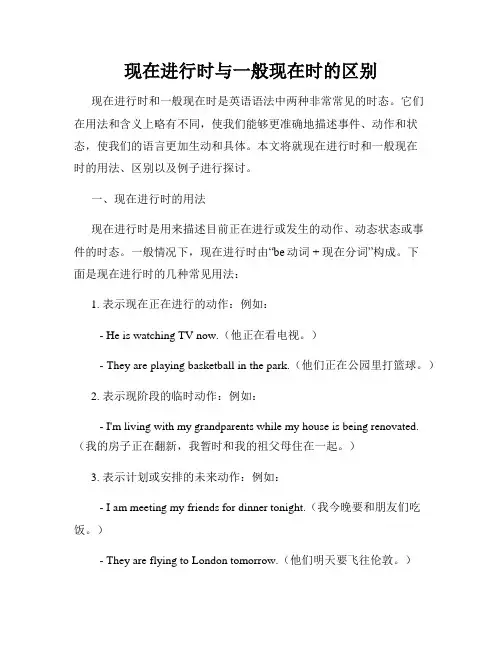
现在进行时与一般现在时的区别现在进行时和一般现在时是英语语法中两种非常常见的时态。
它们在用法和含义上略有不同,使我们能够更准确地描述事件、动作和状态,使我们的语言更加生动和具体。
本文将就现在进行时和一般现在时的用法、区别以及例子进行探讨。
一、现在进行时的用法现在进行时是用来描述目前正在进行或发生的动作、动态状态或事件的时态。
一般情况下,现在进行时由“be动词 + 现在分词”构成。
下面是现在进行时的几种常见用法:1. 表示现在正在进行的动作:例如:- He is watching TV now.(他正在看电视。
)- They are playing basketball in the park.(他们正在公园里打篮球。
)2. 表示现阶段的临时动作:例如:- I'm living with my grandparents while my house is being renovated.(我的房子正在翻新,我暂时和我的祖父母住在一起。
)3. 表示计划或安排的未来动作:例如:- I am meeting my friends for dinner tonight.(我今晚要和朋友们吃饭。
)- They are flying to London tomorrow.(他们明天要飞往伦敦。
)二、一般现在时的用法一般现在时是用来描述经常、习惯性发生的动作或状态的时态。
一般情况下,一般现在时使用动词的原形。
下面是一般现在时的几种常见用法:1. 表示经常性或习惯性的动作:例如:- She drinks a cup of tea every morning.(她每天早上喝一杯茶。
) - They often go shopping on weekends.(他们经常在周末去购物。
)2. 表示普遍真理或客观事实:例如:- The sun rises in the east and sets in the west.(太阳从东方升起,从西方落下。
一般现在时和现在进行时区别及习题
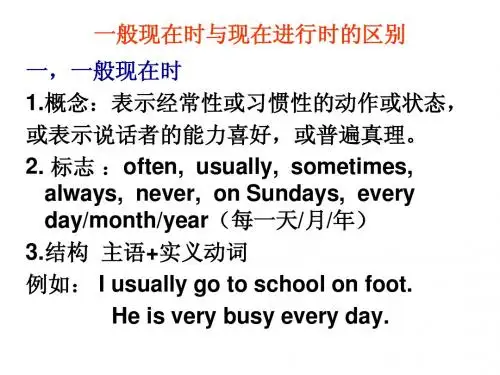
二,用括号内所给动词的适当形式填空 1.Look! The children _________(play) football on the playground. They _________(play) football every Sunday afternoon. 2.Han Meimei ______(like) watching TV. She ______( watch) TV every evening. But now she_______( not watch) TV. She_______( get) ready for her exam.
一般现在时与现在进行时的区别
一,一般现在时 1.概念:表示经常性或习惯性的动作或状态, 或表示说话者的能力喜好,或普遍真理。 2. 标志 :often, usually, sometimes, always, never, on Sundays, every day/month/year(每一天/月/年) 3.结构 主语+实义动词 例如: I usually go to school on foot. He is very busy every day.
( )6. Don’t turn on the TV. Grandma _______ now. A. is sleeping B. will sleep C. slept D. sleeps ( )7. ---______ you ______ a book? ---Yes, I am. A. Do; read B. Are; read C. Are; reading D. Are; looking ( )8. Jenny____ English every evening. A. has study B. studies C. study D. studied ( )9. Wang Mei ____ music and now he____ to music. A. like; listen B. likes; listens C. likes; are listening D. likes ; is listening
现在进行时与一般现在时的区别
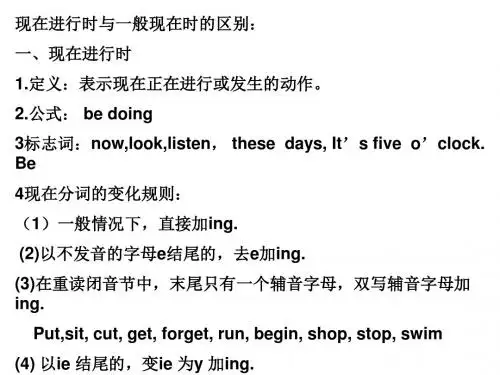
14.She is good at________(make) rules. 15. The school needs help ______(teach) music. 16.Don't practice_______(speak) English here. 17.It takes him half an hour______(finish) his homework.18.It's interesting for him________(play) soccer. 19. I reallyห้องสมุดไป่ตู้want him______(follow) the rules 20.Let me help him______(open) the door. 21.Does he have_______(be) on time?
1.My father always ____(come) back from work very late. 2. The teacher is busy. He ______ (sleep) six hours a day. 3. Listen! Joan _____(sing) in the classroom. She often _____ (sing) there. 4. ____ your brother ____(speak) French? 5. Where _____ you _______ (have) lunch every day. 6. The girl _____(like) wearing a skirt. Look! She ___(wear) a red skirt today.
7. Please______(not do) the dishes now. 8. Her mother wishes_____(make) rules_____(help)her_____(be) a good girl. 9. How long does it take him ______(finish) his homework 10.I need____ (teach) her how____ (learn)English. 11. Either they or Tom________(run) now, right? 12.He usually _______(relax) on weekends. 13.Why don't you think about_______(swim) for half an hour?
一般现在时与现在进行时的区别
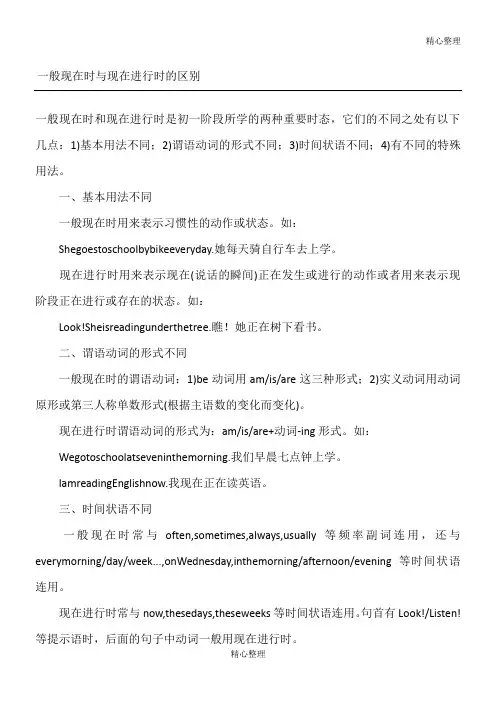
精心整理一般现在时与现在进行时的区别一般现在时和现在进行时是初一阶段所学的两种重要时态,它们的不同之处有以下几点:1)基本用法不同;2)谓语动词的形式不同;3)时间状语不同;4)有不同的特殊用法。
一般现在时常与often,sometimes,always,usually等频率副词连用,还与everymorning/day/week...,onWednesday,inthemorning/afternoon/evening等时间状语连用。
现在进行时常与now,thesedays,theseweeks等时间状语连用。
句首有Look!/Listen!等提示语时,后面的句子中动词一般用现在进行时。
四、特殊用法不同1.一般现在时的特殊用法:表示客观真理、自然现象往往要用一般现在时表示。
如:Themoongoesroundtheearth.月亮绕着地球转。
2.现在进行时的特殊用法:hear、smell、taste、feel、notice、agree、believe、like、hate、want、think、belongseem等。
如:Iknowwhatyoumean.Smithownsacarandahouse.AllthestudentsherebelongtoNo.1MiddleSchool.4少数用于表示起止的动词如come、go、leave、arrive、fly、return、start、begin、pen、close、end、stop等常用一般现在时代替将来时,表示一个按规定、计划或安排要发生的动作。
当be表示根据时间或事先安排,肯定会出现的状态,只用一般现在时。
Theshopclosesat11:00p.m.everyday.②下作:状态的动词:appear,exist,lie,remain,seembelongto,dependon。
(C)表示一时性动作的动词:allow,accept,permit,promise,admit,complete。
一般现在时和现在进行时的区别
一般现在时和现在进行时的区别一、概念不同:一般现在时表示主语经常性和习惯性的动作或存在的状态,也表示说话者的能力及自然现象。
而现在进行时表示说话时(瞬间)正在进行的动作,也表示目前或现阶段一直进行的动作。
如:She often does her homework in the evening. 她经常在晚上做作业。
She is doing her homework now. 现在她正在做作业。
二、在构成方式上的不同:一般现在时中谓语动词的构成有以下三种情况:①be动词的一般现在时形式:am,is,are.②动词have的一般现在时形式:have,has.③其他行为动词的一般现在时形式有动词原形或第三人称单数形式。
而现在进行时中谓语动词的构成是:am/is/are+动词的-ing形式(现在分词)。
三、时间状语不同:一般现在时的时间状语主要有:always,usually,often,sometimes,never,every day,on Sundays,in the morning/afternoon/evening等;现在进行时的时间状语主要有:now,these days,this week,at the moment等,有时句首有“Look!”、“Listen!”或“It’s+时刻”等词、句存在。
如:We play football in the afternoon.我们在下午踢足球。
(一般现在时)My mother is reading a newspaper now. 我妈妈正在看报纸。
(现在进行时)四、感情色彩不同:一般现在时往往不带任何感情色彩,语气比较肯定。
现在进行时常带有一定的感情色彩,并多与always,often等副词连用。
如:Mr. Li works hard in the factory. 李先生在工厂工作努力。
(说明事实,语气比较肯定)Mr. Li is always working hard in the factory.李先生在工厂工作一直很努力。
一般现在和现在进行时区别
1一般现在时一.定义: 一般现在时表示现在经常反复发生的动作、存在的状态或习惯性的动作的时态二.形式: 主语+动词原形/ 动词的单数形式一般现在时用行为动词的原形,但第三人称单数作主语时,动词的词尾要加+S。
一般的动词词尾+S。
以sh/ch/s/x/o结尾的词+es。
以辅音字母+y结尾的把y变成i,+es。
三.用法:1. 表示经常的或习惯性的动作,常与表示频度的时间状语连用。
时间状语: always, usually, regularly, every morning/night/evening/day/week, often, rarely, sometimes, hardly, occasionally, from time to time, twice a week, seldom, once a month, ev er, never.Example: He is always late for school.2:表示主语具备的性格、能力、身份、特性、喜好,天气等。
Examples:I study in a middle school.Ann Wang writes good English but does not speak well. He likes football. This fruit taste s good. It is sunny.3. 表示自然规律。
Examples: The earth moves around the sun.4. 格言或警句中。
Example: Pride goes before a fall. 骄者必败。
5. 表示按规定、计划或时间表将要发生的事。
1)适用于下列动词:come, go, arrive, leave, start, begin, return的一般现在时表将来。
这主要用来表示在时间上已确定或安排好的事情。
The train leaves at six tomorrow morning. When does the bus star? It stars in ten minutes.2)在倒装句中,表示动作正在进行,如: There goes the bell. = The bell is ringing. Here comes the bus. = The bus is coming.3)在时间或条件从句中When Bill comes, ask him to wait for me. I'll write to you as soon as I arrive there.动词现在分词动词现在分词由动词原形在词尾加ing构成,其规则如下:(1)一般情况下直接加 think---thinking sleep---sleeping study---studying speak---speaking (2)以不发音的字母e结尾的单词,去掉字母e,再加 ingwake---waking make---making come---coming take---taking leave---leaving have---having (3)以ie结尾的动词,把ie改为y ,再加ing die---dying lie---lying(4)以重读闭音节结尾,呈现“辅,元,辅”结构的动词,先双写末尾的辅音字母,再加ing stop---stopping sit---sitting run---running forget---forgetting begin---beginning 注:以重读闭音节结尾,呈现“辅,元,辅”结构的动词,先双写末尾的辅音字母,再加ing 。
一般现在时和现在进行时的区别
一般现在时和现在进行时的区别一般现在时表示现在的状态;表示经常的或习惯性的动作;表示主语具备的性格、能力等。
现在进行时表示现在某一时刻或某段时间正在进行的动作或存在的状态。
接下来,小编给大家准备了一般现在时和现在进行时的区别,欢迎大家参考与借鉴。
一般现在时和现在进行时的区别结构不同1. 一般现在时的结构(以肯定句为例)有以下几种形式:⑴ 动词be第一人称单数用am,第三人称单数用is,其他的一律用are。
例如:I am a student. 我是个学生。
He is an American. 他是个美国人。
They are good friends. 他们是好朋友。
⑵ 动词have除了第三人称单数用has外,其他一律用have。
例如:He has two brothers. 他有两个兄弟。
We have English classes every day. 我们每天都上英语课。
⑶ 实义动词除第三人称单数在动词原形后加-s或-es外,其他一律用动词原形。
例如:His mother works1 in a hospital. 他母亲在一家医院工作。
Children like to play this game. 孩子们喜欢玩这种游戏。
2. 现在进行时的结构为:助动词be(am/is/are)+ v-ing形式。
例如:We are singing and they are dancing. 我们在唱歌,他们在跳舞。
时间状语不同1. 一般现在时的时间状语通常为often,always,usually,sometimes,every day/week/month等。
例如:I get up at six every day. 我每天六点钟起床。
He often goes to school on foot. 他经常步行上学。
Sometimes they play football after school. 有时他们放学后踢足球。
现在进行时和一般现在时的区别
现在进行时和一般现在时的区别现在进行时和一般现在时都是英语语法中的两种时态,但在使用和表达上有着明显的区别。
本文将详细探讨现在进行时和一般现在时的区别,并提供一些例子来帮助理解。
1. 现在进行时:现在进行时是描述目前正在发生的动作或正在进行的状态。
它通常由“be动词+动词的ing形式”构成。
以下是现在进行时的几种常见用法:表示目前的动作或状态:- I am writing an article.(我正在写一篇文章。
)- They are playing soccer in the park.(他们正在公园里踢足球。
)表示暂时的活动或计划:- She is staying at her friend's house for the weekend.(她周末暂时住在朋友家。
)- We are going to the movies later.(我们稍后要去看电影。
)表示反复发生的动作:- He is always forgetting his keys.(他总是忘记带钥匙。
)- They are constantly arguing about politics.(他们总是在争论政治。
)2. 一般现在时:一般现在时用来描述经常发生或普遍存在的动作或状态,它是最基本的时态形式。
以下是一般现在时的几种常见用法:表示普遍真理或事实:- The sun rises in the east.(太阳从东方升起。
)- Water boils at 100 degrees Celsius.(水在100摄氏度时沸腾。
)表示习惯性动作:- I brush my teeth twice a day.(我每天刷两次牙。
)- They always go jogging in the morning.(他们每天早上都去慢跑。
)表示情感、感觉、态度:- I love chocolate.(我喜欢巧克力。
)- She hates spiders.(她讨厌蜘蛛。
- 1、下载文档前请自行甄别文档内容的完整性,平台不提供额外的编辑、内容补充、找答案等附加服务。
- 2、"仅部分预览"的文档,不可在线预览部分如存在完整性等问题,可反馈申请退款(可完整预览的文档不适用该条件!)。
- 3、如文档侵犯您的权益,请联系客服反馈,我们会尽快为您处理(人工客服工作时间:9:00-18:30)。
般现在时与现在进行时的区别
、定义不同
、谓语部分的构成不同
.时间状语不同
•写出下列动词的第三人称单数形式和ing形式。
1. give ________________ 6.stop _________________ 11.run _______
2. move ________________ 7.carry ________________ 12.swim ______
3. draw ________________ 8.tell _________________ 13.sit ______
4. see _________________ 9.wear _________________ 14.make ______ _____
5. watch _______ 10.forget _________________ 15.have ___ _____
二.用动词的适当形式填空。
1. We often (play) in the playground.
2. He (get) up at six o ' clock.
3. ____ you _______ (brush) your teeth every morni ng.
4. What (do) ______ h e usually (do) ___ after school?
5. Danny _____ (study) En glish, Chin ese, math, scie nee and art at school.
6. Mike sometimes ________ (go) to the park with his sister.
7. At eight at ni ght, she _____ (watch) TV with his pare nts.
8. _______ Mike _________ (read) En glish every day?
9. How many less ons _________ your classmate _______ (have) on Mon day?
10. What time __________ his mother _______ (do) the housework?
11. I (talk).You ________ (liste n)to me now.
12. Look, the boy ________ (run )fast.
13. ----What are you doi ng?
----1 _______ (do) my homework.
14. ---- _____ the students ______ (read) En glish.
----Yes, they are.
15. Tom ______ (n ot study)E nglish. He is study ing Chin ese.
16. ----Who _____ (si ng)a so ng now?
----Li Yi ng is.
17. The girl ____ (not eat)ba nanas now.
18. ----Where __ they (sta nd)?
----They are sta nding over there.
19. Look! The boy over there ____ (play) a model pla ne.
20. ----What is Meimei doi ng now?
----She (watch)TV with her pare nts
三•按照要求该写句子
1. I do my homework every day.
否定句:
一般疑问句:
特殊疑问句(对划线部分提问):
2. Daniel watches TV every evening.
否定句:
一般疑问句:
特殊疑问句(对划线部分提问):
3. I ' m playing football on the playground .
否定句:
一般疑问句:
特殊疑问句(对划线部分提问):
4. Tom is readi ng books in his study room .
否定句:
一般疑问句:
特殊疑问句(对划线部分提问):。
